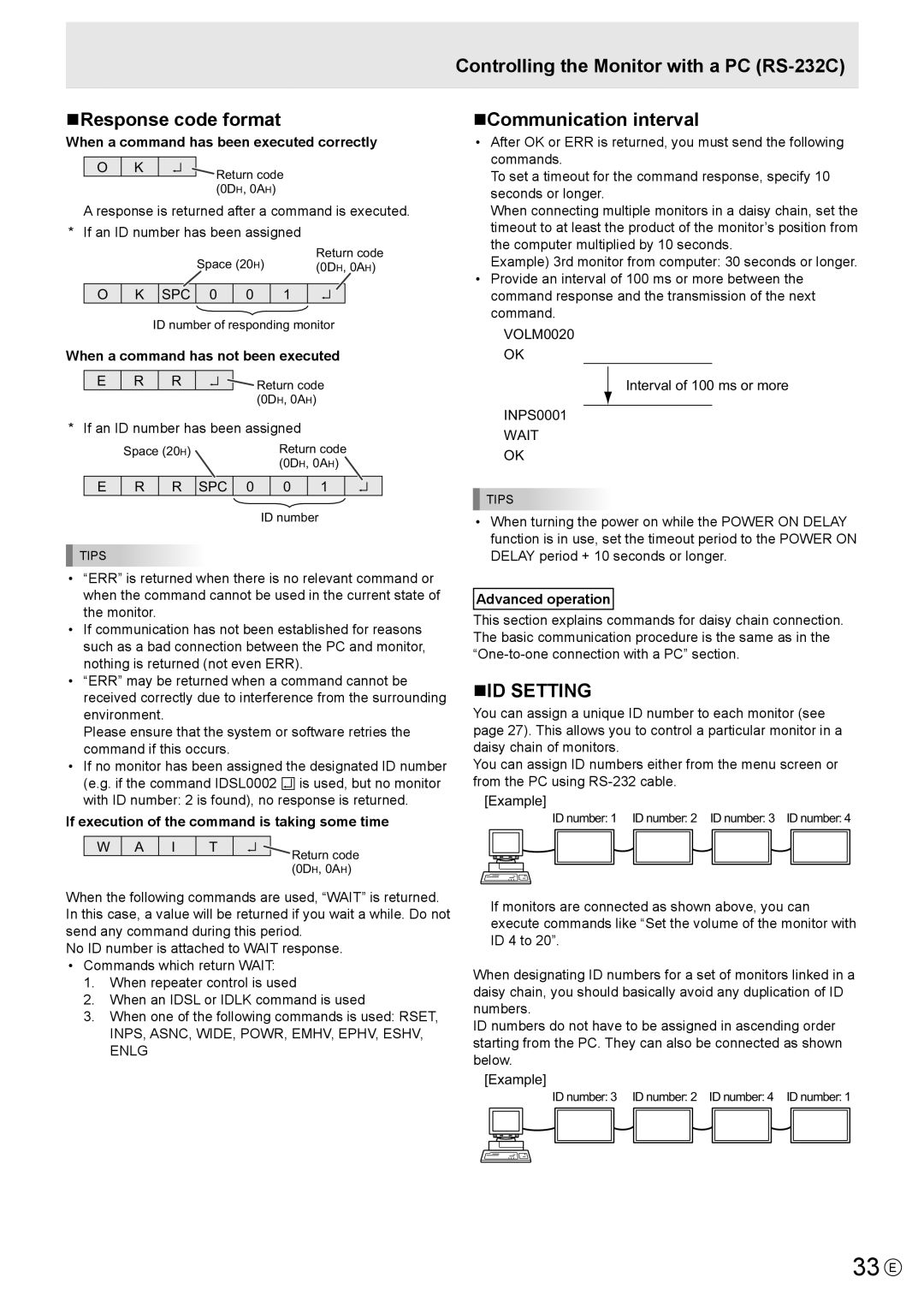
nResponse code format
When a command has been executed correctly
O | K |
|
|
| Return code |
|
|
| |||
|
|
|
|
| |
|
|
|
|
| |
|
|
|
|
| (0DH, 0AH) |
A response is returned after a command is executed. * If an ID number has been assigned
|
|
| Space (20H) |
| Return code | ||||
|
|
|
| (0DH, 0AH) | |||||
|
|
|
|
|
|
|
|
|
|
O | K | SPC | 0 | 0 | 1 |
|
|
|
|
|
|
|
| ||||||
|
|
|
|
|
|
|
|
|
|
ID number of responding monitor
When a command has not been executed
ER R ![]()
![]()
![]()
![]() Return code (0DH, 0AH)
Return code (0DH, 0AH)
*If an ID number has been assigned
| Space (20H) | Return code | |||||||
|
|
|
|
| (0DH, 0AH) | ||||
|
|
|
|
|
|
|
|
|
|
E | R | R | SPC | 0 | 0 | 1 |
|
|
|
|
|
| |||||||
|
|
|
|
|
|
|
|
|
|
ID number
TIPS
•“ERR” is returned when there is no relevant command or when the command cannot be used in the current state of the monitor.
•If communication has not been established for reasons such as a bad connection between the PC and monitor, nothing is returned (not even ERR).
•“ERR” may be returned when a command cannot be received correctly due to interference from the surrounding environment.
Please ensure that the system or software retries the command if this occurs.
•If no monitor has been assigned the designated ID number
(e.g. if the command IDSL0002 ![]()
![]()
![]()
![]() is used, but no monitor with ID number: 2 is found), no response is returned.
is used, but no monitor with ID number: 2 is found), no response is returned.
If execution of the command is taking some time
W | A | I | T |
|
|
|
| Return code |
| ||||||||
|
|
|
|
|
|
|
| |
|
|
|
|
|
|
|
| |
|
|
|
|
|
|
|
| (0DH, 0AH) |
Controlling the Monitor with a PC
nCommunication interval
•After OK or ERR is returned, you must send the following commands.
To set a timeout for the command response, specify 10 seconds or longer.
When connecting multiple monitors in a daisy chain, set the timeout to at least the product of the monitor’s position from the computer multiplied by 10 seconds.
Example) 3rd monitor from computer: 30 seconds or longer.
•Provide an interval of 100 ms or more between the command response and the transmission of the next command.
VOLM0020
OK
Interval of 100 ms or more
INPS0001
WAIT
OK
TIPS
•When turning the power on while the POWER ON DELAY function is in use, set the timeout period to the POWER ON
DELAY period + 10 seconds or longer.
Advanced operation
This section explains commands for daisy chain connection. The basic communication procedure is the same as in the
nID SETTING
You can assign a unique ID number to each monitor (see page 27). This allows you to control a particular monitor in a daisy chain of monitors.
You can assign ID numbers either from the menu screen or from the PC using
[Example]
ID number: 1 ID number: 2 ID number: 3 ID number: 4
When the following commands are used, “WAIT” is returned. In this case, a value will be returned if you wait a while. Do not send any command during this period.
No ID number is attached to WAIT response.
•Commands which return WAIT:
1.When repeater control is used
2.When an IDSL or IDLK command is used
3.When one of the following commands is used: RSET, INPS, ASNC, WIDE, POWR, EMHV, EPHV, ESHV,
ENLG
If monitors are connected as shown above, you can execute commands like “Set the volume of the monitor with ID 4 to 20”.
When designating ID numbers for a set of monitors linked in a daisy chain, you should basically avoid any duplication of ID numbers.
ID numbers do not have to be assigned in ascending order starting from the PC. They can also be connected as shown below.
[Example]
ID number: 3 ID number: 2 ID number: 4 ID number: 1
